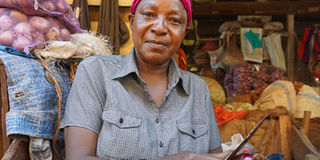Nnume yields hefty profits from Owino market

From selling tomatoes and onions in Owino market, Victoria Nnume has managed to pay school fees for her children, build her residential house and rentals. Photo by Phionah Nassanga
What you need to know:
- Iron woman. At the mention of the word Owino, the first thing that comes into many people’s minds is confusion and commotion, particularly for corporate people. Amid this commotion, Victoria Nnume has made her name and fortune in the market by selling tomatoes and onions. She shared her business journey with Phionah Nassanga.
Watching her go about her business, Victoria Nnume appears knowledgeable, confident, with a sense of purpose. However, it is difficult to imagine she has hustled in Owino for the last 23 years.
Joining Owino in 1995, Nume says the vegetables, fruits, and other items were spread out on makeshift stalls and bare ground that was often soggy because the market was in a swamp, on the edge of the Nakivubo channel.
First hustle
“Growing up, I knew three prestigious professions for women; teaching, nursing and secretarial work. My dream was to become a teacher, but I was not able to achieve that because my father, the family bread winner was imprisoned. My mother was not working,” Nnume reveals.
With shattered dreams, in 1986, Nnume dropped out of school, in Primary Seven. As fate would have it, in one of the remotest villages in Kamuli District, Nume had no option but to resort to digging and helping her mother with house chores.
Nnume says her mother then was buying bunches of matooke and other agricultural products from farmers in her village, which she sold to vendors in Iganga market to fend for her family.
Inspiration
Having seen her mother do business for some years, at the age of 18, Nnume says she had gained enough experience to start her own business.
Armed with determination, Nnume started buying sweet bananas from farmers and sold them in the same market where her mother worked.
“Doing this kind of business involved getting onto trucks with agricultural produce and selling to vendors in the crowded market. It was odd then for a girl child to climb trucks. It was a preserve for men. That’s why many thought I had no morals then,” she adds.
However, Nnume later gave up on the market and joined a music, dance and drama women’s group. Each time I performed I was given an allowance, but the amount depended on the number of people who attended,” she recalls.
From traditional dances and folk songs, Nnume saved some money to start a business.
Joining Owino market
“I joined Owino market in 1995 with Shs50,000. When I started, I was selling tomatoes. Everyday, I bought boxes of tomatoes and sold them. After each box was sold, I went back to Nakasero market to buy another. Each box was worth Shs6,000. My day started at 6am and by 12pm, I went back home,” Nnume reveals.
To have the best produce, Nnume says she had to be in the market between 3am and 4am. Moving in the wee hours of the morning, Nnume wore a pair of shorts where she hid her working capital.
“Before I left home, I ensured my money was tucked away either in a pair of shorts or in the shoes. Carrying a hand bag at that time was too risky,” she recalls.
Without a permanent stall, she had her tomatoes displayed on the ground by the Nakivubo channel, opposite the old taxi park. “I paid Shs3, 000 every week for the space I occupied,” she recalls.
Challenges
From her first box of tomatoes, she made a profit of Shs10,000, which encouraged her to work harder. Nnume who wanted to own a stall in the market, started saving Shs2,000 to Shs3,000 everyday.
However, she says this did not come easily because the market’s structures and demarcations kept changing from time to time. From Nakivubo channel, where she sold tomatoes, she was later shifted to Katuba market, where market structures were made of papyrus.
Nnume says everytime the market got a facelift, rent fees were increased. From paying rent of Shs3,000 per week, in Katuba market, she had to pay shs20,000 per month, and before she knew it, it had increased to Shs250,000.
“Relocating affected my clientele and sales. Each time the structures changed, I was displaced thus losing out on clients.”
Selling tomatoes only, the money that the mother of seven made then catered for rent, school fees and welfare. Determined to make it, Nnume later changed from selling tomatoes to onions. She says she started with a working capital of Shs150, 000 for the onions.
Achievements
After saving for a long time, in 2017, Nnume saw her dream of owning a stall come to pass. “I bought this stall at Shs7m. From selling onions and tomatoes, I have been able to see all my seven children through school. My last born is currently lecturing at Uganda Christian University. I built a house and rentals in Lungujja, in Wakiso District,” she joyfully shares.
Advice
“As you wait for your monthly pay, plan to have a side business. Market jobs seem dirty but they are profitable. Start something that will boost your income.
Skills
For proper management of her business, Nnume attended a three-month
financial
training. “Lecturers from Muteesa Royal University came to Owino market and taught us about book keeping, financial management and stocktaking, among other financial skills,” she adds.




